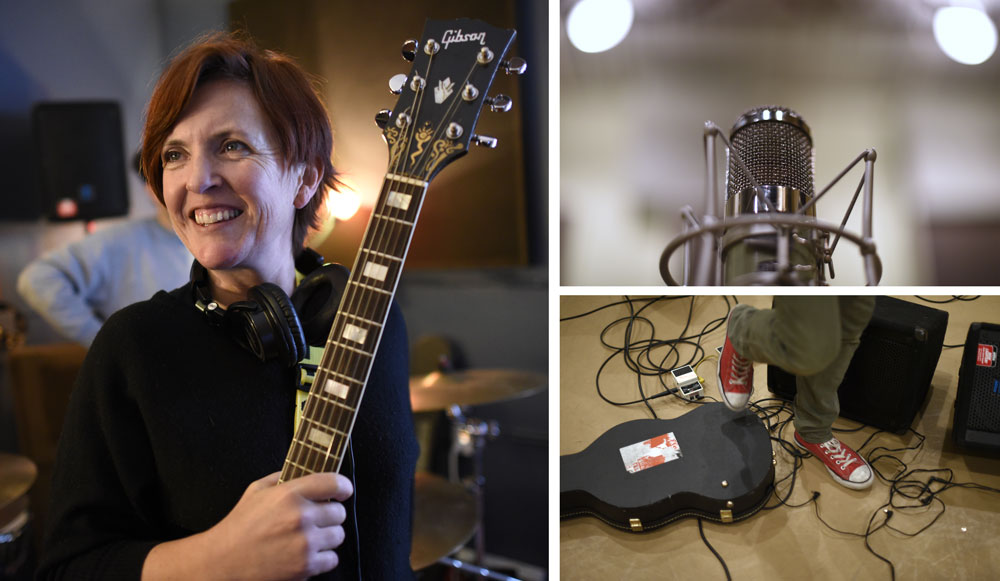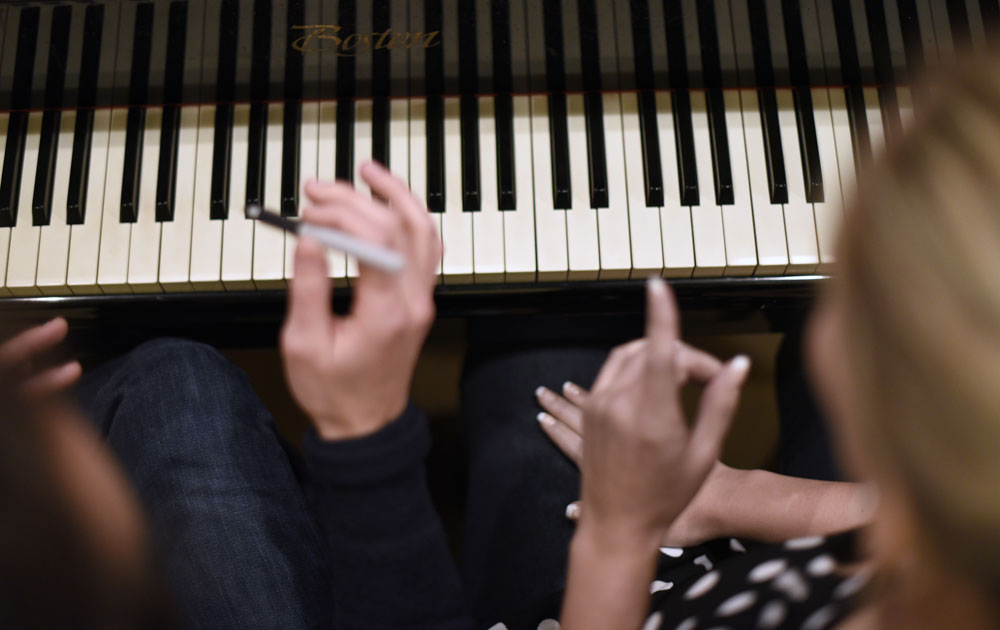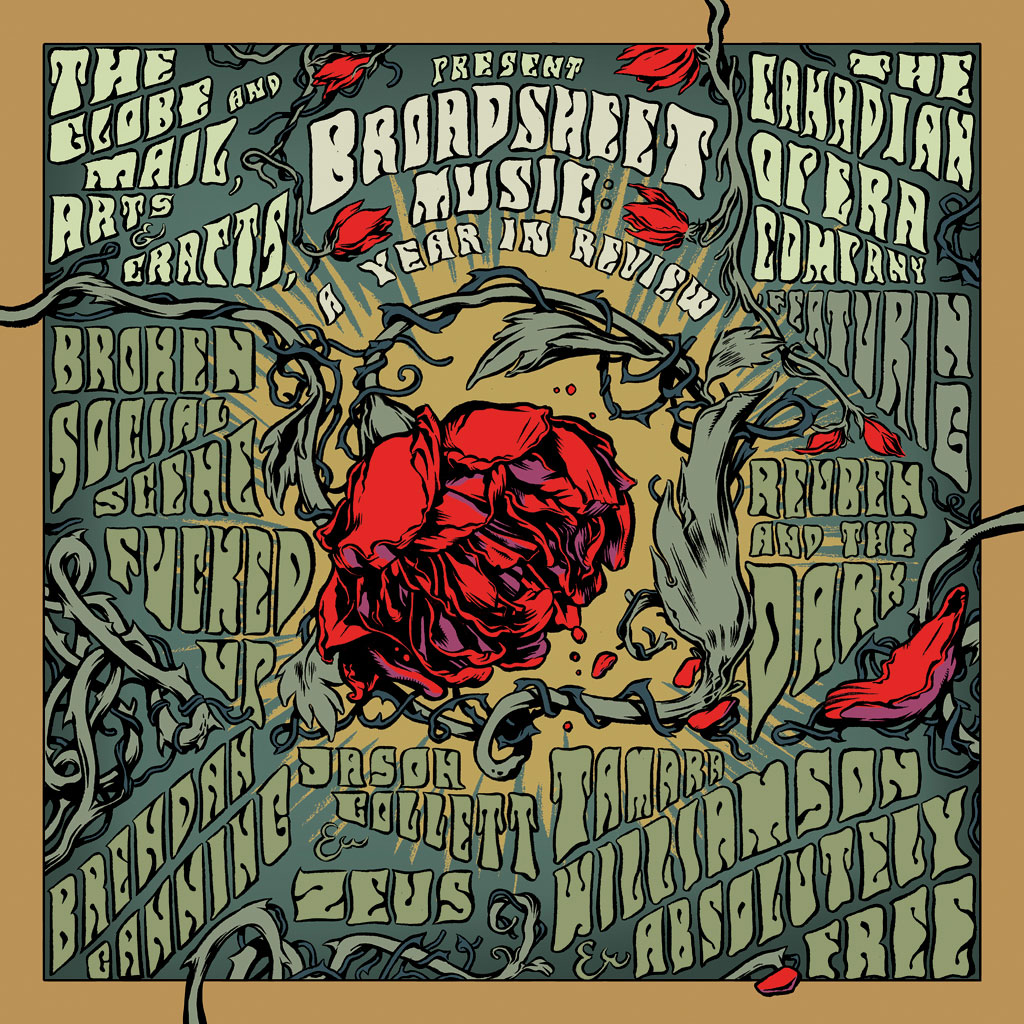What would the year sound like, if it were music? That is the simple question with which this project started. The Globe approached Arts & Crafts, the country's premier independent record label, and the Canadian Opera Company and the result is stranger and more beautiful than we could have hoped: Six original compositions that offer unique interpretations of some of 2014's most important events and trends. –Jared Bland, Arts editor

On a chilly afternoon a few weeks ago, Broken Social Scene’s Charles Spearin was pacing through one of the Canadian Opera Company’s downtown Toronto rehearsal studios, trying to explain the full tragicomic potential of Paul Calandra to the indie-rock band Zeus.
“Thomas Mulcair asked him a question about troops in Iraq and he started just saying something completely ridiculous about how the NDP doesn’t support Israel,” said Spearin, referring to the surreal episode this fall in which the parliamentary secretary to the Prime Minister responded to a series of straightforward questions with the seemingly unhinged repetition of an irrelevant talking point, as if caught in some awful partisan tape loop.
“Then a few days later he apologized and just broke down and wept. You should watch the YouTube video,” said Spearin. The members of Zeus chuckled. “So maybe a song called Calandra’s Tears?”
What if we made music about what happened in the news this year? Globe Arts editor Jared Bland and Arts & Crafts co-owner and president Jeffrey Remedios explain the making of Broadsheet Music: A Year in Review.
Spearin – a tall multi-instrumentalist who looks as if he’s perpetually hiding the fraction of a bemused smile behind his impressive mustache – was acting as the music director of a project initiated by this newspaper: a collaboration between the Canadian Opera Company and various bands from the Arts & Crafts label on an album about the year in news.
It was early December and Spearin didn’t yet have a single song, but he was treating the encroaching deadline with typical equanimity. He padded around the lofty rehearsal room in his socks, adjusting microphones, patiently arranging the various tracks he was working with on his laptop. All you could do was put creative people in the same room; the songs would either come or they wouldn’t. “It’s like a fishing trip,” he explained. “You can pack all your gear and go to the lake, but that doesn’t mean you’re going to catch a fish.”
Zeus, a quartet of scruffy guys in various plaids and wool sweaters, had spent the day developing the foundation of a new song – a layer of drums and keyboard followed by a wash of reverb-heavy guitar and a synth line that dipped and buzzed ominously, like a swarm of bees. Now they just needed lyrics.
The Calandra suggestion didn’t seem to be taking. “If we had enough words to fill eight syllables and just sang them over the melody, that would work,” said Zeus’s Carlin Nicholson.
“Something to do with bees? GMOs? ‘Where’s the buzz?’” said Spearin, spitballing. “Do you feel the buzz?”
Two opera singers tentatively entered the studio: Karine Boucher, a bubbly 25-year-old soprano from Quebec City, and Owen McCausland, a 24-year-old tenor from Saint John.

A musical collaboration is a delicate thing. Just having a stranger rifle through your iTunes collection is unnerving enough; exposing your tastes and talents to a roomful of people from an entirely different musical world – improvising when you’ve spent your life interpreting – can be a strangely intimate and intimidating experience.
“We don’t have lyrics yet,” Zeus’s Neil Quin explained. “But maybe you can just sing something crazy over the track?”
McCausland and Boucher sat at the piano to chart out some harmonies. “So you want us to be effed up?” Boucher asked sweetly in her Québécois accent.
“Do something freaky,” Quin said. “Like, I’m imagining…” – he searched for a note on the piano. “A high G?”
Boucher looked at him steadily. “Are you crazy?”
“Do you have any sheet music?” McCausland asked. Zeus did not have any sheet music, so the tenor hurried off to find some while the band continued brainstorming subject matter.
“What if we record a five-year-old girl talking about Instagram, Facebook, getting an online presence,” Quin said enthusiastically. “And then we have a man very authoritatively reading, like, the Privacy Act or something on top of it?”
“What, before the song?” asked Nicholson.
“During the song,” said Quin.

Over the next few weeks, musicians rotated through the Canadian Opera Company rehearsal hall and Spearin’s home studio, contributing a horn line here, a guest vocal there.
One afternoon, Brendan Canning, co-founder of Broken Social Scene, came by the COC to work with the opera singers on a tribute to actor Robin Williams, a delicate lullaby over acoustic guitar.
Canning wandered around the room, dishevelled hair kept out of his face in a half-hearted top-knot, figuring out vocal harmonies on a harpsichord. Mikolaj Debowski and Christopher Butcher, two young trombonists sent by the Royal Conservatory of Music, knocked on the door, took off their winter coats, and quickly improvised a tag to the song – a lyrical line that curled around the melody before landing gently.
“Try to keep that diminished run soft, it’s not a loud blast,” Spearin reminded them after an enthusiastic run-through.
“Sorry, I just got excited, with the diminished scale,” explained Butcher.
“Who wouldn’t?” said Canning.
Slowly, the songs took shape. In a year in which the bad news seemed to accumulate like snow against the front door – a year in which it sometimes felt like the only appropriate musical response to the world was a wheezing dirge or a sustained scream – it was no surprise that so many of the tunes were less than cheery.
Singer-songwriter Tamara Williamson wrote a song called The Next One – a response to the sexual-assault allegations that have dominated the news these last months – and Spearin sent a demo to the band Absolutely Free. The trio blasted the recording from their van stereo while they finished their West Coast tour, mapping out ideas for atmospheric synth lines and complementary melodies as they made their way across the frozen countryside, from Vancouver through the Rockies to Toronto.
Broken Social Scene contributed a rambling jam culled from an earlier recording session that the band said was appropriate for 2014, “a year of incredible brutality.” The Calgary folk band Reuben and the Dark sent in a brooding tribute to missing aboriginal women. Spearin and the trombonists added a mournful horn part – an elegiac outro that stopped, like the stories of the women, without a satisfying resolution.
In the end, after much reflection, Zeus decided against the spoken-word commentary against social media and adopted words by Jason Collett: a twisted love letter to Jerusalem from the point of view of a jealous lover.

Late one Friday, the hard-core punk band Fucked Up came by the COC studio to work out their contribution. The rehearsal hall was scattered with instruments – guitars plugged into amps, a kick drum and a snare, all of them abandoned.
“We showed up with all our instruments but then we worked with the opera singers,” said guitarist Josh Zucker. “We didn’t want to mess with their voices and put a bunch of guitars under them.” Instead, the band famous for raucous shows in which growling front-man Damian (Pink Eyes) Abraham smashes pint glasses over his head, was writing a miniature Italian opera.
“Instanto sono stato,” said drummer-turned-librettist Jonah Falco, tapping out the rhythm of a particularly tricky passage while sitting at the piano with the soprano Boucher. “Tu mi sussurro,” he said, rolling his “r.”
Falco riffled through the three dense pages of lyrics that he’d translated into rudimentary Italian with the help of Google (“a hobby slash curse slash skill of mine,” he explained). He plinked out a melody on the piano while Boucher followed along. “It’s like a little music box,” he said. “It sounds a little Parisian and creepy.”
The 17-minute, six-act opera was more or less a reimagining of the current collaboration, following a young singer seduced by a trickster who promises her ultimate musical freedom if she abandons her stuffy genre. “The past are my shackles, that must be erased,” she announces midway through. “Goodbye, prisoners, my life must speak for itself!”

Like most operas, it ends badly. “She gets so enthusiastic that she starts screaming and shouting and swearing and she loses her voice,” said Falco. “And she has to sing through a veil of tears or some other crummy mixed metaphor.”
If the opera was related to the year in news, the story was an evergreen: a perpetually topical tale about ambition thwarted and dreams of freedom ending in tragedy.
Falco played the piano intro and Boucher stepped to the mike and sang, her powerful soprano filling the room. Falco hit a bum note. “Sorry, it’s been a long time since I played piano like a 12-year-old,” he said.
“Just relax, hands down,” said Boucher encouragingly. “I can be here forever.”
The next take Boucher got caught on line, hitting the wrong emphasis. She cursed loudly in French.
“Okay, let’s go!” said Falco, hyping them up for another take.
“Now, for serious,” said Boucher.
“Okay, rip it!” said the audio engineer, and Falco started up his lilting music-box melody again.
Playlist:
How the music came to be


Golden Facelift
by Broken Social Scene
Golden Facelift is a song recorded during the Forgiveness Rock Record sessions, but which ultimately did not make the final cut for one reason or another. It is a song we as a band all felt strongly about lyrically and musically and we wanted to give it a proper unveiling when the time was right. We feel that chance is now as this year draws to a close; 2014 has not been without its beauty, but it has also been a year of incredible brutality and all of humanity has a great deal to answer for. Broken Social Scene aims to echo the voice and concerns of the underdog while creating music that will hopefully inspire those who are doing good and useful things for this planet and humankind. – Broken Social Scene

Red River
by Reuben and the Dark
Red River was influenced by recent news of missing aboriginal women on Highway 16 in British Columbia, as well as by the story of Tina Fontaine. It was a hard topic to approach. I tried to avoid it, but it continued to come back to me until I felt a strong conviction to follow through. There were a lot of heavy hearts and tears through the process, from researching to recording and mixing. It had the same effect on everyone involved. These are things that need to be talked about. It should be disturbing. It should be heartbreaking. And we should be doing something about it. – Reuben Bullock, Reuben and the Dark

The Next One
by Tamara Williamson and Absolutely Free
I’m just about to release a record called Sister Mother Daughter Wife, and I’ve been thinking about stories of women where their civil liberties have been overridden, all these terrible situations. Then so many news stories about abuse broke. I was blown away by them, and they led to a lot of conversations with friends and people I know. I started to think about the difficulties of women reporting men, and how they can stay silent. I came to the conclusion that you don’t get to live with it – it’ll follow you around your whole life. So the bottom line for me is that you have to think about the next person, the next one, and you have to be strong for them, because they could end up far worse off than you did. – Tamara Williamson
We were on tour when we were asked to do this, and thought it might be too big a project to do on tour in one week – we were in California or something. The demo we heard was just Tamara and her guitar. We listened to the song, and the musical ideas and lyrical content were so harrowing. This is an issue we are very cognizant of, and are happy to support Tamara’s voice. So, we listened to it over and over in the van, figured out the notes, and started adding digital instruments to sketch out ideas onto a grid. We were adding and arranging stuff as we were driving in the van – an arpeggio here, a synth sample there, that sort of thing, instead of listening to the radio or whatever. It was like sitting in a control room hurtling across the continent, probably the most productive drive ever. Absolutely Free, we’re more musicians than singer-songwriters, so we wanted to stay true to Tamara’s vision and just be the accompaniment. We changed the arrangement a little bit. Would it sound like we made it in the van? But once we replaced the digital marimba with our Jupiter-8, and got Tamara to do her vocals live with us, everything started to come to life. – Matt King, Absolutely Free

Voce Rubata
by Fucked Up
We were thrilled to work with singers from the COC, but when we had a chance to talk to them and get into the rehearsal space, we realized that we had less than 24 hours. We went in with a vague idea, tore it up, started again. We didn’t want to waste those singers in a half-baked punk song. Mike, our guitar player, came up with the shell of an idea of a singer who was lured from her art by the illusion of freedom, promised by a nefarious stranger. We were interested in creating a piece that seized the musical opportunity rather than addressing one particular moment, but the frame of the story – a person who is free leaving the structures in which they’ve grown to do something new, only to have that illusion shattered by reality – is a very old narrative, and one that we see echoed throughout stories in this or any other year. – Jonah Falco, Fucked Up

Jerusalem
by Jason Collett and Zeus
Jerusalem came about because I originally submitted some lyrics about violence against women, a theme that’s heavy on my mind right now. But then Charles Spearin [Broadsheet Music’s music director] told me that someone was working on a song like that, so I left him with those in case they contributed there. But it just sort of popped into my head that the incidents throughout this year in Jerusalem, where one side kidnapped teenagers, and another side kidnapped another teenager and immolated him – for me, the angle of violence against women opened a small door for a way for me to approach writing about the hornet’s nest of Jerusalem. I took the position of a violent, jealous lover, and went in that direction. Either side can read into that how they wish. But the issue of men’s tendency toward doing so much damage in the world: that was my theme. – Jason Collett

No Doubt or Fire
by Brendan Canning
Robin Williams as a song topic was Charles Spearin’s idea. I had my guitar in a slight variation of an alternate tuning I like to use and that was what got the song going initially. The guitar motif was quite old-timey if you will, but I was hoping for a fresh take on a very traditional idea. Charlie pulled up a list of films Robin Williams had appeared in, and I wrote the lyrics on the spot. We were talking about Dead Poets Society and one of the opera singers mentioned [the Walt Whitman poem] O Captain! My Captain!, and I thought, that’s a good line! I had the basic melody structure written already. Conceptually, it’s very strange to get an e-mail like the one I got from Charlie. “Do you want to write a song about Robin Williams? Thought so. See you next Wednesday.” I was up for it. – Brendan Canning